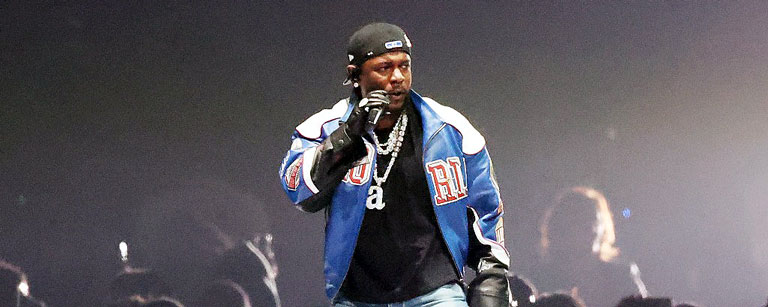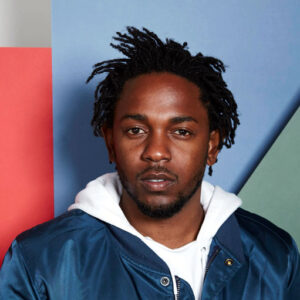
Kendrick Lamar Kicks Me In The Shin
What the fuck are you doing? My better judgment kicks me in the shin, about what I am about to write. I reply that I just think I am obligated to recognize a person’s work no matter if I barely understand the genre. Humans owe the truth to one another. Wouldn’t you agree?
To feel clueless, dumbfounded by an expression outside of my limited cultural habitat is not unusual. With enough exposure one “crosses over” one’s ignorance, and maybe learns-to-love something that was incoherent at first blush, even repulsive. A great deal of this world strikes me as a jigsaw puzzle in a box. Some examples would be: the Russian language, opera, calculus, Sanskrit, hip-hop, – the list would be endless.
Perhaps you tuned in to the advertising spectacle of Super Bowl LXI. The half time show CLICK HERE featured Kendrick Lamar. The visual experience of synchronous movement of bodies on a darkened platform, bodies representing the American flag instantly conveyed the artist’s intention to speak to the complicated concept of America. I understood very little of Lamar’s spoken hip-hop lyric. Then slowly I realized the message was not primarily meant for old white guys (my community.) This message was meant as an appeal of resistance to and on behalf of Lamar’s community.
Then a friend emailed me the complete lyrics of the show. After mindfully reading over these verses I am moved by the epic, Odyssey-like recounting of the journey of a man and of a people which this represents. Kendrick Lamar merits getting to know. Here are a few lines from the half time performance and a sketch of Lamar’s life taken from wikipedia.
[Part IX: All The Stars]
Tell me what you gon’ do to me
Confrontation ain’t nothin’ new to me
You can bring a bullet, bring a morgue, bring a sword
But you can’t bring the truth to me
Bump you and all your expectations
I don’t even want your congratulations
I recognize your false confidence, promises
All in your conversation
I hate those that feel entitled
Look at me crazy ’cause I ain’t invite you
Oh, you important? You the moral to the story? You endorsin’?
I don’t even like you
Corrupt a man’s heart with a gift
That’s how you find out who you dealin’ with
A small percentage who I’m buildin’ with
I want the credit if I’m losin’ or I’m winnin’
On my mama, Solána
 Kendrick Lamar Duckworth
Kendrick Lamar Duckworth
June 17, 1987 (age 37)
Compton, California, U.S.
Kendrick Lamar Duckworth is an American rapper. Regarded as one of the most influential hip-hop artists of his generation, and one of the greatest rappers of all time, he was awarded the 2018 Pulitzer Prize for Music, becoming the first musician outside of the classical and jazz genres to receive the honor.
Kendrick Lamar Duckworth was born on June 17, 1987, in Compton, California. He is the first child of former gang hustler Kenneth “Kenny” Duckworth and hairdresser Paula Oliver. Both of his parents are African Americans from the South Side of Chicago. When they were teenagers, they relocated to Compton in 1984, due to his father’s affiliation with the Gangster Disciples. Lamar was named after singer-songwriter Eddie Kendricks of the Temptations. He was an only child until the age of seven and was described as a loner by his mother. Eventually, his parents had his two younger brothers and younger sister, businesswoman Kayla Sawyer (née Duckworth). His cousins include basketball player Nick Young and rapper Baby Keem.
Lamar and his family lived in Section 8 housing, were reliant on welfare and food stamps, and experienced homelessness. Although he is not a member of a particular gang, he grew up with close affiliates of the Westside Pirus. Despite suffering hardships, Lamar remembered having “good memories” of his childhood that sparked his interest in hip hop music, such as sneaking into his parents’ house parties. He was raised secular, although he occasionally attended church services and was taught the Bible by his grandmother. He felt “spiritually unsatisfied” as a child due to the “empty” and “one-sided” nature of the sermons.
After hearing a recording of his voice for the first time, Lamar became interested in rapping. He was introduced to police brutality after experiencing the first day of the 1992 Los Angeles riots. When he was five years old, he witnessed a murder for the first time while sitting outside of his apartment unit, as a teenage drug dealer was killed in a drive-by shooting. “It done something to me right then and there,” Lamar later admitted to NPR Music. “It let me know that this is not only something that I’m looking at, but it’s something that maybe I have to get used to.” His parents nicknamed him “Man-Man” due to his precocious behavior, although he confessed it “put a stigma on the idea of me reacting as a kid sometimes—I would hurt myself and they would expect me not to cry.”
In school, Lamar was a quiet and observant student who excelled academically and had a noticeable stutter. His first grade teacher at Robert E. McNair Elementary School encouraged him to become a writer after she heard him correctly use the word “audacity”. As a seventh grade student at Vanguard Learning Center, Lamar was introduced to poetry by his English teacher, Regis Inge. Inge integrated the literary form into his curriculum as a response to the growing racial tensions amongst his students. Through its connection to hip hop, Lamar studied rhymes, metaphors and double entendres, which made him fall in love with songwriting: “You can put all your feelings down on a sheet of paper, and they’d make sense to you. I liked that.” Instead of completing assignments for other classes, Lamar would scribe lyrics in his notebooks. His initial writing was entirely profane, but it helped him manage his psychological trauma and depression, which he struggled with during his adolescence. Inge played a vital role in his intellectual growth, often critiquing his lexicon and suggesting prompts to strengthen his prose.
Lamar later attended Centennial High School. He was enrolled in summer school during the tenth grade, which he dreaded because it forced him to be embroiled in a gang war. Despite his efforts to avoid them, Lamar soon became heavily involved with Compton’s hedonistic gang culture, which led to numerous health scares and encounters with the police. He distanced himself from the lifestyle following an intervention staged by his father. When he was 16, Lamar was baptized and converted to Christianity following the death of a friend. He graduated from high school in 2005 as a straight-A student. He considered studying psychology and astronomy in college, but suspended his academic pursuits to focus on his music career.
_*_
Lamar has received various accolades, including 22 Grammy Awards (the third-most won by a rapper), a Primetime Emmy Award, a Brit Award, 4 American Music Awards, 7 Billboard Music Awards, 11 MTV Video Music Awards (including 2 Video of the Year wins), and a record 37 BET Hip Hop Awards. Time listed him as one of the 100 most influential people in the world in 2016. Three of his works were included in Rolling Stone’s 2020 revision of the 500 Greatest Albums of All Time.
Post Script: Thank goodness for a first grade teacher!
2 thoughts on “Kendrick Lamar Kicks Me In The Shin”
Appreciating a culture one doesn’t completely understand is a wonderful thing .
Does history offer ANY examples of acclaimed poets who were universally lauded, and whose work was interpreted the same way by all who heard it?
(I don’t fathom much rap or hip-hop either, being separated from it not only by age and culture but by sex. I’m just not the target audience, which is fine. I sometimes admire the medium’s rhymes, but find its staccato rhythm jarring — even “Hamilton” which I otherwise admire.)